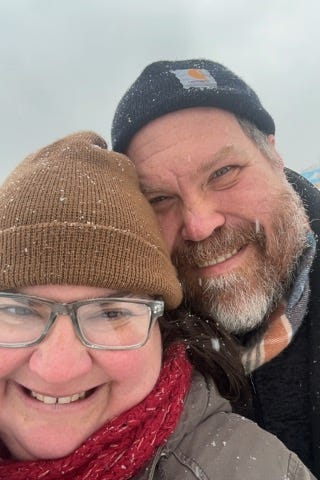A different way to think about feedback
Working through some feelings about Elizabeth Gilbert's Big Magic, and pictures of snowy Coney Island
Hi friends,
First—I’m sending so much love to all of my friends in southern California. ❤️ If you need anything, I’m here.
More frivolously, last Monday was my birthday (and also my son’s birthday!) And it snowed! I convinced my husband to play hooky with me and we went to Coney Island and played in the snow-sand and then ate Georgian food, and it was perfect and eerie to have the place virtually to ourselves. I like remembering that New York is a coastal city, and I also like finding moments where it’s totally quiet here. One thing I’m trying to do this year is to slightly skew my perceptions of the world, and Monday was a fun way to do that.
A parting of the ways with Elizabeth Gilbert
I spent a series of commutes last year with the audiobook of Elizabeth Gilbert’s Big Magic. It’s recommended everywhere, undeniably fun/woo, but it was a lot for this left-brained INTJ to process (which is why it’s good for me! Expand those horizons!) Most of it has faded into the million-word slurry of my brain, but there’s one scene I’ve been mad about for months now. I vividly remember where I listened to it.
I had dinner with my delightful friend Wendy at our favorite place in Jersey City (hi Wendy!). I was a little tipsy (our favorite place is generous with carafes of white wine), and waiting for the D at West 4 St, watching a rat wrestle a chip bag on the tracks, as I listened to Liz Gilbert’s dulcet voice explain that she’d been working on a book about the Amazon, but life got in the way so she ignored the book. Sometime later, she had lunch with Ann Pratchett, who revealed that she was writing a book about the Amazon with the same plot and characters. The muse, Liz concludes, must have given up and traveled with the idea instead of letting it die. If you don’t pay attention to your ideas, the muse will rehome them. Ideas don’t belong to you, but are a supernatural gift, that can be rescinded if you don’t treat the gift with sufficient deference and attention.
Friends. When I tell you this goes against everything I believe about writing. And yet, it’s been stuck in my head for the past year and change, and has manifested itself in my coaching and writing in one very concrete way. And it has everything to do with how we give people feedback.
What we get wrong about advice giving
Before you read on, hear me say thank you. Thank you for doing the reading, taking your time, being a reviewer, encouraging your scholars, all of it. We build our entire world on your unpaid labor, so thank you.
I’ve written before about how I think people are overly eager to hire editors or use AI to skip early, painful, ugly writing stages, which are all attempts to outsource the actual hard part of the writing (thinking. thinking is hard).
When people ask us for advice (as graders, beta readers, discussants on panels, book workshop participants, reviewers, editors), it feels great. We don’t have to write! We can just read! And think! And be helpful! And it is really fun (trust me, I know—I do it for a living) to help people make a manuscript better.
And so those of us who aren’t assholes pour a lot of ourselves into the feedback process. We have ideas! Reframings! Questions! Connections! Literature! And often, we’re so helpful, we forget to ask the most important question: what does this manuscript want to be? Or, what is this scholar meant, to write in this moment?
Where Liz Gilbert isn’t entirely wrong
Those last two questions have become a kind of mantra for me as I’ve evolved in my editing process.
What does this manuscript want to be?
What is this author meant, in this moment, to write?
I find that it makes me a more discerning editor, but a quieter editor: I think of manuscripts that are in front of me as puzzles. I ask more questions as I edit, trying to draw out the full potential of what an author is trying to say. I read to hear the author’s voice, find where it’s strongest, and then suggest how to have the whole manuscript speak in that voice.
And when clients come to me with zombie projects, or because they’re feeling stuck, we end up spending some time talking about the feedback they’ve already gotten on the project, and how that’s changed what they’re writing. Very often, they’re blocked because they’re trying to write a manuscript that isn’t theirs—to implement feedback that challenges the identity of the project so fundamentally it becomes impossible for them to write. I am much quicker to say things like “here’s an idea that you might hate” or “this might not work but what if we try…”
A better way to think about feedback
So if you’re trying to bring a more minimalist approach to early reading, and provide feedback that allows projects to become what they’re meant to be, here are two ways to start.
In very early drafts (when you’re a beta reader or a patient, reassuring best work friend), I think you can limit your feedback to:
—> this is great (and I want to know more about it!)
—> this is confusing/unclear (and I need more to understand it).
—> here’s something fun to read that might help!
—> keep writing!
That’s it!
When you’re reading something a little more advanced, here are some questions to keep in mind as you read:
—> why this project?
—> why this approach/method?
—> why this author?
—> why now?
If you can answer all 4 of these, it’s a pretty successful project. (For me: I know the question/ argument and its significance to scholarship, I know precisely how they’re investigating the question and why they chose this method and how it aligns with the question, and I am convinced that they have the knowledge/skills/positionality to write this particular piece). If I can’t answer them, or they have multiple answers, something’s not quite right, and I would frame my feedback in terms of questions that might help the author get at the answers to these questions.
In the end…
It’s so easy to be presented with an underdeveloped argument and rush to fill the void (maybe out of fear that the muse will lose patience with us and we’ll lose what we started). Instead, perhaps try these:
In every case, I have started thinking about my interventions not as a “to-do” list to present to the author, but as a set of hypotheses for us to test about what will help this project exist in the world. And the nice thing about hypotheses is that rejecting tells you just as much about the world as accepting them does.
The last thing I want to say is that I’ve tried to approach failures I see in manuscripts with a sense of curiosity instead of correction. When you encounter something that isn’t working, ask why it’s there, instead of telling the writer that it’s not working (trust me, they know—they just don’t know a better way to do things). By helping them think back one level of the decision tree, you can help them brainstorm a better way (parent the child, not the behavior, but for manuscripts).
Alright friends, keep writing! And being generous with your feedback!
Kelly
What’s going on around here
You can see all of what we’re doing in 2025 here.
Come write with us! Mirya and I are thrilled to announce the first-ever MEE-Centered Mini-Retreat, at the coziest little bed and breakfast in midtown Houston April 7-9, 2025. We hope you can join us for 48 hours of focused time to do nothing but write. If you’ve wanted to try one of our retreats before, but a week seems like a long time to spend away, this one’s for you! Details are here, and please let me know if you have any questions. Like most of our retreats, we anticipate that this one will fill quickly!
Last chance for Spring 2025 Writers’ Circles (January-March 2025)
Small groups of no more than eight people focused on creating the conditions to write more, and more effectively. So many people want to join this year that I’ve opened our very first third session! Here are the times. I anticipate that these will fill, so if you’re interested sign up soon!
Mondays, 1230-2, Early-career scholars
Thursdays, 11-1230, Mid-career scholars
So You Want to Write A Book?
A unique hybrid workshop dedicated to supporting writers throughout their book writing journey. Start with a new cohort in May! Enjoy discounted registration/early bird pricing through February 15. This year’s cohort just had our January meeting, and it was SO MUCH FUN! Such smart people doing cool projects. Come join us in May!
Editing: I’m accepting new projects to edit in 2025! My editing calendar fills up three-to-six months in advance, so if you have something you’re hoping to get edited, this is a great time to chat about it.





I have been bothered forever by that piece of Elizabeth Gilberts’ advice too! It’s stuck in my head like: damn, if I don’t finish my story ASAP someone else will do it. Yikes!!! If nothing else, it HAS motivated me to finish my story. Heaven forbid some random person steals my idea from the idea ethers or muse and writes MY story. Another thing: I haven’t questioned her crappy advice once! If Liz says so - I guess it’s true. Liz Gilbert speaks for the muse…. *play ethereal harp music AND *insert eye roll. I’m chucking that crap advice out the window now. Thank you